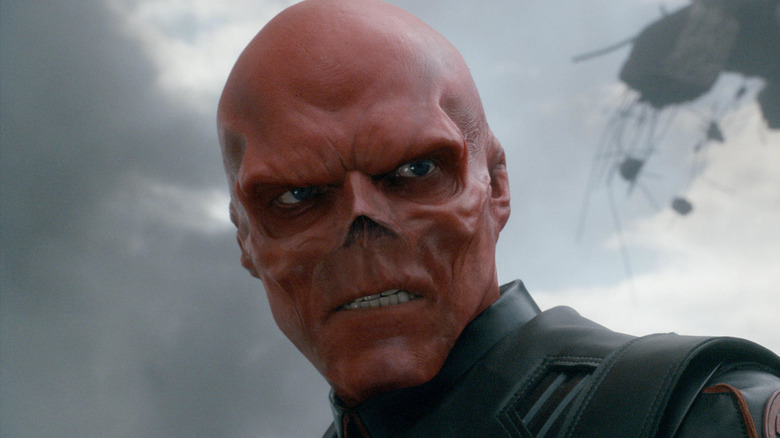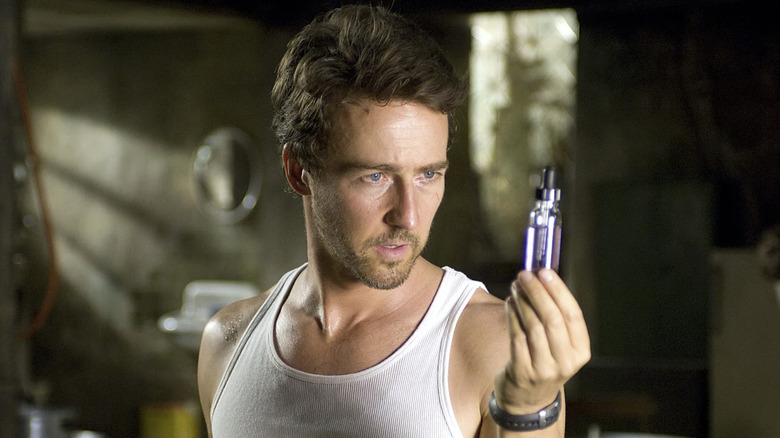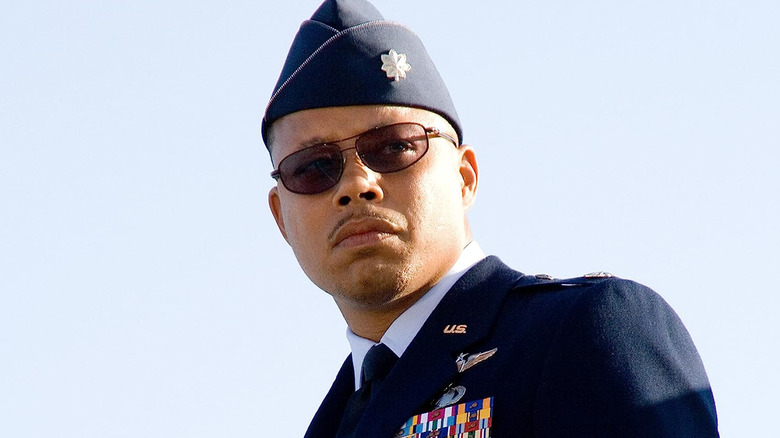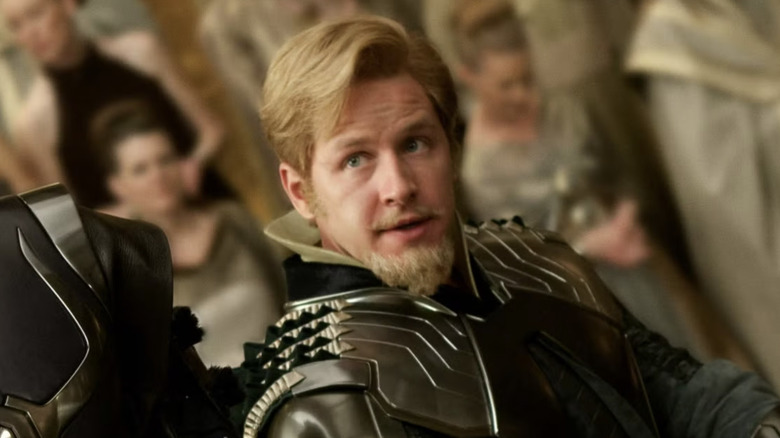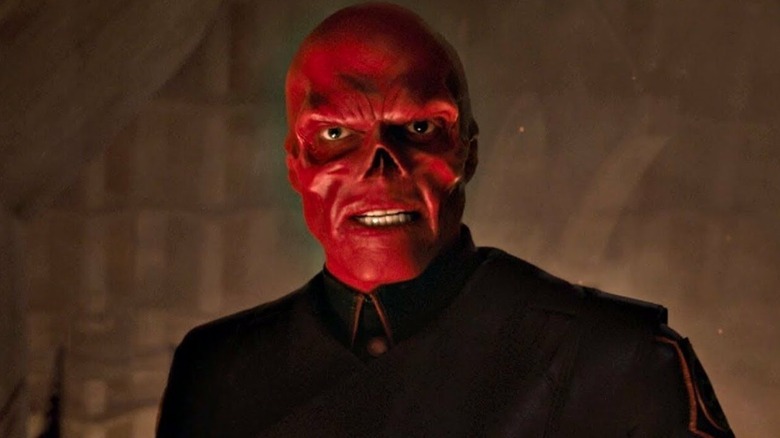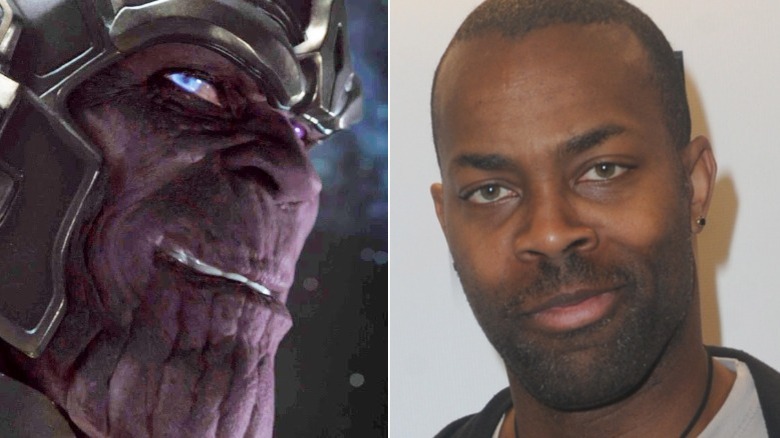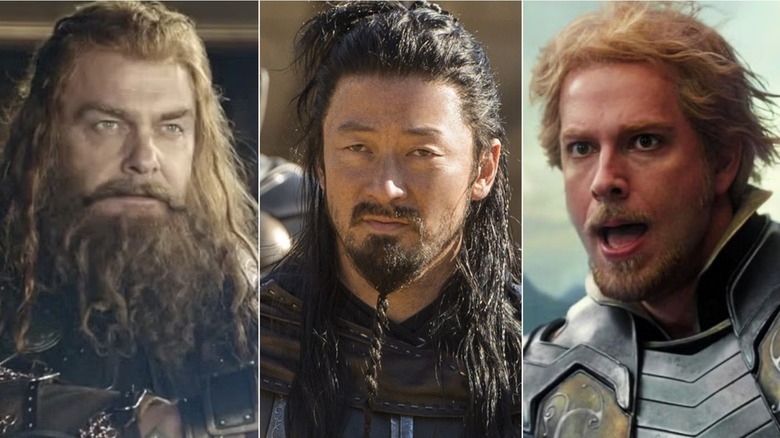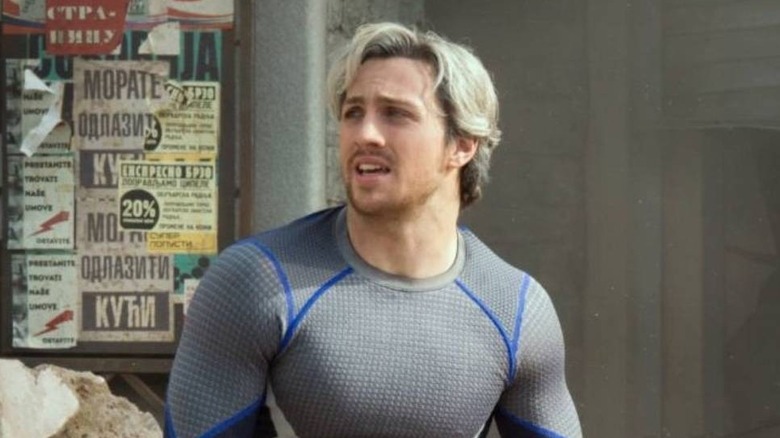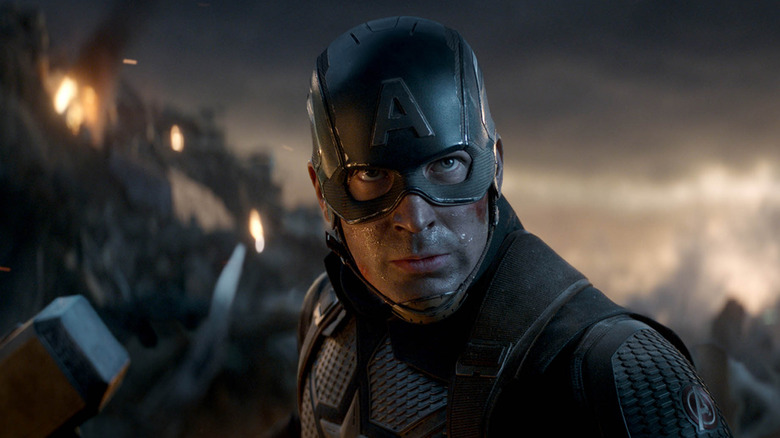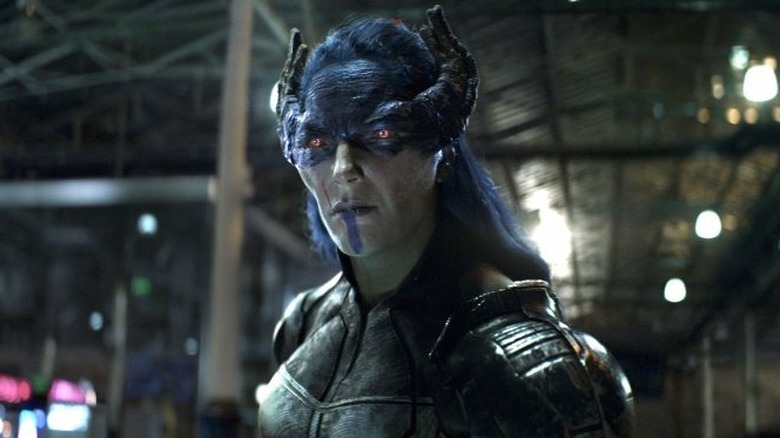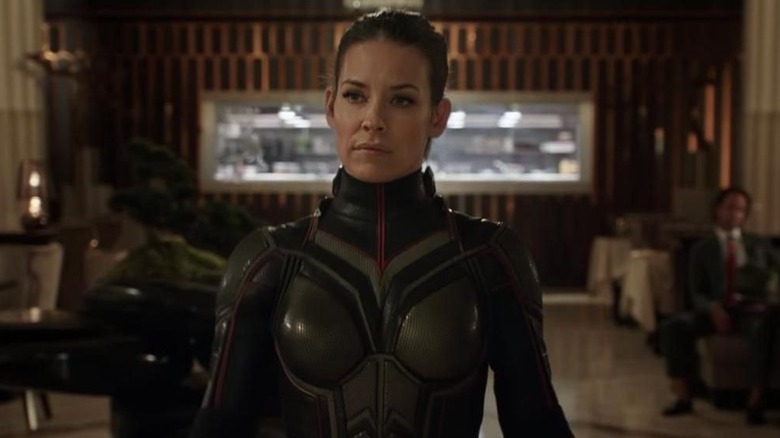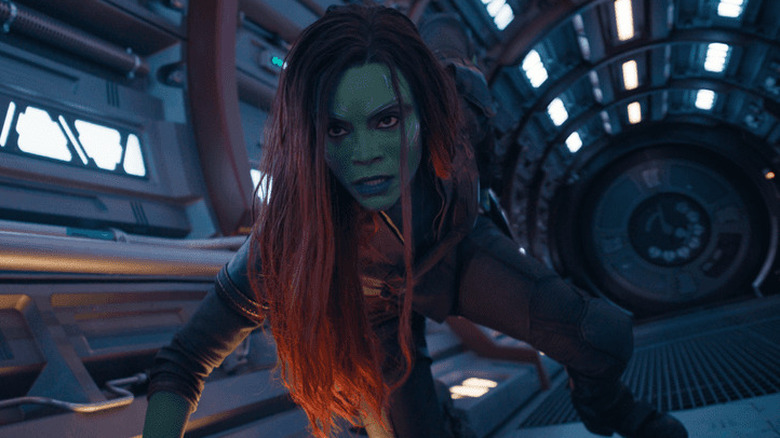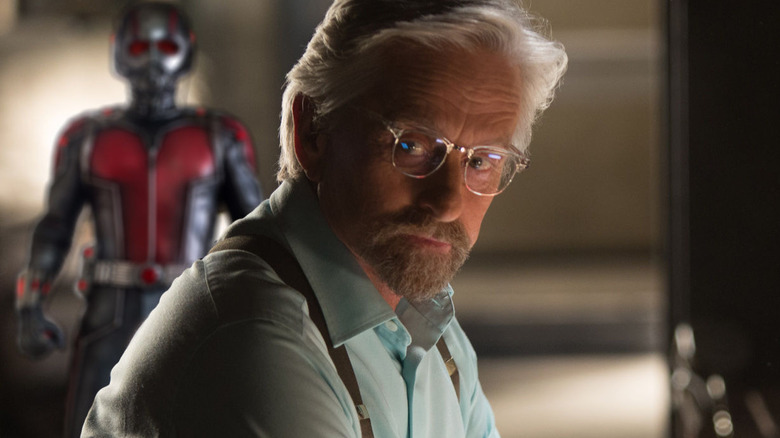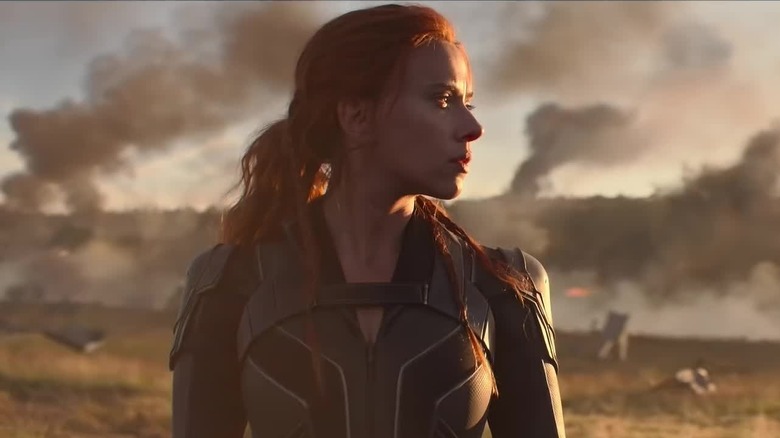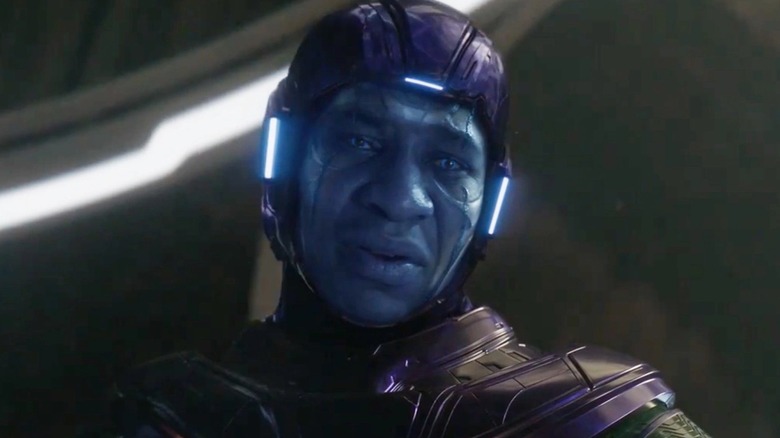The Real Reasons These Actors Are No Longer Part Of The MCU
If enough fans make noise about wanting the return of a favorite comic book character, then it's a simple enough matter for an editor to contact their titles' writers to let them know it's time to give the fans what they want. Unfortunately, it isn't quite as simple to bring back a character in Marvel's film adaptations, no matter how bad the fans want it.
Because of the interconnected nature of the MCU, it's easy to see the cast of the various films as part of a large onscreen family. Likewise, it's easy to forget the MCU's actors have their own aspirations that may understandably lead them away from Marvel. We all love Chris Hemsworth as Thor so much that we're certain he would never tire of fumbling with prop hammers or staring at green screens and pretending they're breathtaking alien landscapes, but that doesn't make it so.
Quite a few actors have left the MCU even though in some cases their characters remained. Some are unhappy with Marvel, some have fallen out of love with blockbusters altogether, some lost their spots due to nothing more mysterious than scheduling conflicts, and some are just waiting for their chance — remote as they may be — to return. Here are the real reasons these actors are no longer a part of the MCU.
Edward Norton
A lot of fans were surprised when Marvel Studios announced in a 2010 press release that it wouldn't ask "The Incredible Hulk" star Edward Norton to reprise his role in "The Avengers," saying they wanted an actor who "embodie[d] the creativity and collaborative spirit of our other talented cast members." Norton's agent called the statement "offensive" and claimed the studio unexpectedly cut off negotiations after "several weeks of civil, uncontentious discussions." Norton changed his story over the years, telling NPR in 2014 that he chose to leave the role because he wanted more diversity in his career.
Before 2010 there was already bad blood between Norton and Marvel. Norton signed on to the lead in "The Incredible Hulk" under the condition that he could rewrite Zak Penn's script. Marvel agreed and while Norton's added scenes were shot, most were cut before release. Two months before the film's premiere, Norton was reportedly refusing to do press for it.
The break with Marvel is still on Norton's mind. In July 2018 — just over a decade after the release of "The Incredible Hulk" – he took a swipe at Marvel during "Comedy Central's Roast of Bruce Willis," using his turn at the podium to say (via Cinemablend), "I tried to be like [Willis]. I did a big action movie called 'The Incredible Hulk.' You know what went wrong? I wanted a better script."
Terrence Howard
According to Terrence Howard, the reason he didn't get to reprise his role as James Rhodes in "Iron Man 2" and beyond is simple — money. Howard discussed his side of things in 2013 with Andy Cohen on "Watch What Happens Live" (via Vulture), alleging that Robert Downey Jr. "took the money that was supposed to go to me and pushed me out." Howard said Marvel signed him up for three films and that when it was time to make "Iron Man 2," they demanded he take an almost 90% pay cut. "I called my friend," Howard added, "that I helped get the first job, and he didn't call me back for three months."
Howard clarified what he meant about helping his "friend" get the lead in "Iron Man" in 2015, saying he was cast before Downey and that he took a $1 million pay cut to help convince Downey to jump on board — though Marvel disagreed with Howard's story.
Howard returned to "Watch What Happens Live" in 2017 and said fences were mended between him and Downey. "We just realized life is too short," Howard said. "Everybody is making money now." Howard also said Marvel threatened him with legal action after his public attacks on Downey and Marvel. When asked about his 2013 interview when he first accused Downey of pushing him out, Howard said, "I shouldn't have gotten drunk. It's my fault ... I ran my mouth."
Josh Dallas
Fandral of the Warriors Three wasn't the most pivotal character in 2011's "Thor," so it's understandable if you didn't notice an entirely different actor took over the role in 2013's "Thor: The Dark World." Josh Dallas did an excellent job playing the swashbuckling ladies' man in "Thor" and comic book purists will tell you that of all the Warriors Three, he was the one whose physical portrayal was the most faithful to that of the comics.
But Dallas was replaced by Zachary Levi in the next two "Thor" sequels, and the change had nothing to with a lack of confidence in the actor's skill or talent, any behind-the-scenes drama, or any contentious negotiations. It was merely a matter of scheduling. Shortly before "Thor" was released, Dallas appeared on ABC's "Once Upon a Time" as Prince Charming/David Nolan. He originally planned to appear in "Thor: The Dark World," but the shooting schedule conflicted with "Once Upon a Time."
Dallas told Entertainment Weekly in 2012 that he was "bummed" about the situation, but it couldn't be helped. "I had such a great experience and great time making the first film and was really excited about coming back," he insisted. "I love Marvel. I wish them all the best." Dallas later said that reprising the role would have meant flying back and forth between the "Thor: The Dark World" production in London and the "Once Upon a Time" set in Vancouver, which understandably wasn't something he wanted to do.
Hugo Weaving
While The Red Skull does appear in "Avengers: Infinity War" and "Avengers: Endgame," that isn't Hugo Weaving playing him. Ross Marquand (best known as Aaron on AMC's "The Walking Dead") replaced Weaving in the third and fourth "Avengers" films.
While Weaving signed a multi-picture deal with Marvel Studios, he decided he didn't want to return after "Captain America: The First Avenger," and told Collider he wasn't concerned about Marvel muscling him into fulfilling his contract. "I would be obliged to, if they forced me to," Weaving said, "but they wouldn't want to force someone to do it, if they didn't want to." Unlike Terrence Howard, there aren't any reports of Weaving harboring harsh feelings toward Marvel; rather, he wanted to turn his attention away from blockbusters. "I think I've done my dash with that sort of film," Weaving told Collider. "To be honest, it's not the sort of film I seek out and am excited by."
A quick glance at Weaving's filmography shows he has remained true to his word. Since "Captain America: The First Avenger," the only blockbuster film roles Weaving has done were reprising the elf Elrond in the first and third movies in "The Hobbit" trilogy, as well as a part in the Peter Jackson-produced "Mortal Engines."
Damion Poitier
While you'd be hard-pressed to find many fans complaining about Josh Brolin's casting as Thanos, he wasn't the first guy to play the Mad Titan. Brolin first played Thanos in 2014's "Guardians of the Galaxy," but it wasn't Brolin giving us that sinister profile in the mid-credits scene of 2012's "The Avengers" — that was Damion Poitier, best known as Duprez in HBO's "True Blood."
Poitier told Geeks WorldWide (via ComicBookMovie) that he didn't know he'd been cast as Thanos until he was sitting in the make-up chair. "I thought I was Kl'rt," Poitier said, referring to an alien villain better known as Super Skrull. "I thought I was going to be Super Skrull, because the whole rumor was that the Skrulls were going to be in 'Avengers.'"
There aren't any reports of Marvel being unhappy with Poitier's performance. More likely it wasn't a question of Poitier being the wrong choice, but of Brolin being so right. Though he never reprised his role as Thanos, "The Avengers" wasn't Poitier's last appearance in the MCU. He had a small speaking role in "Captain America: Civil War" as one of Crossbones' henchmen — the one who threatens to drop a vial filled with a biological weapon before Black Widow (Scarlett Johansson) takes him out.
The Warriors Three
While 2017's "Thor: Ragnarok" was unquestionably a hit, one event in the film left fans furious. When Hela (Cate Blanchett) arrives on Asgard, she immediately dispatches two of the famous Warriors Three: Volstagg (Ray Stevenson) and Fandral (Zachary Levi). Their demises are dealt with swiftly and with little warning, and they are never mentioned again in the film. Hogun the Grim (Tadanobu Asano) gets at least a few lines of dialogue and a bit of a tussle with Hela before she offs him.
Kevin Feige addressed the reason why the Warriors Three weren't seen again in the MCU in a November 2017 press conference. Feige said the filmmakers wanted to make sure the audience saw Hela as a real threat. "[The Warriors Three] had noble ends, mainly to serve the arrival of Hela," Feige said (via ScreenRant). The Marvel Studios president went on to call Hela "the biggest villain in the MCU," pointing out how quickly and easily she begins her campaign of destruction in Asgard.
The following month at the Heroes and Villains Fan fest in San Jose, California, Levi admitted to fans that he was disappointed not only with leaving the MCU, but that Fandral's final words were left on the cutting room floor. According to Levi, the way the scene was originally shot, the swashbuckling ladies' man charged Hela crying "For Asgard!"
Aaron Taylor-Johnson
Aaron Taylor-Johnson's Quicksilver didn't survive 2015's "Avengers: Age of Ultron." The speedster sacrificed himself to save Hawkeye (Jeremy Renner) and a Sokovian boy from Ultron (James Spader) in the film's final battle. His death came as a surprise to a lot of fans who were quick to speculate that the motivation to kill the character had something to do with Evan Peters being introduced as Quicksilver in the previous year's "X-Men: Days of Future Past" — long before Disney acquired Fox.
Speaking to MTV in May 2015, Kevin Feige said Fox's Quicksilver had nothing to do with the decision. "[Quicksilver's death] adds stakes to the ending of the film ... to show repercussions to Ultron's actions, and also in a way to solidify Scarlet Witch's character, and Wanda's arc in the movie and where we'll see her in the next films." Feige added that Quicksilver died in "every draft" of the script.
In 2016, while promoting "Nocturnal Animals," Taylor-Johnson told Dateline (via Comic Book Movie) that "Age of Ultron" writer/director Joss Whedon was "lulling the audience into a false sense of security," and playing with the widespread fan belief that it would be Hawkeye who didn't survive the film. But Taylor-Johnson said something a little different while talking to CinemaBlend in 2015. While he did say the plan always was for Quicksilver to die, he also admitted there was a costume designed for him if his character were to survive and that it was "really cool."
Chris Evans
In the MCU, Captain America was quite literally the first Avenger. Chris Evans played Steve Rogers from his humble World War II beginnings as an unremarkable human soldier in "Captain America: The First Avenger" all the way to saving the entire universe in "Avengers: Endgame." That movie also saw Cap use time travel and the multiverse to his advantage to live an entirely different, non-superhero life, and audiences get their last glimpse of the character as a contented old man who got to have his happily ever after.
Despite having such a definitive finale to the original Captain America's arc — with Anthony Mackie's Falcon picking up the Captain America mantle — Evans has been repeatedly asked in the years since "Endgame" whether he would be coming back to reprise the role. He's continued to maintain his retirement from the MCU, reaffirming his decision to leave while the Steve Rogers character was still at his creative peak; wanting to move on to other acting opportunities; and also no longer wanting to do the intense amount of work it took to keep up that super soldier physique.
The fact that some of Evans's fellow OG Avengers actors either never went away, or were announced to return for "Avengers: Doomsday" — including Hayley Atwell as Peggy Carter — really kicked up the dust of a possible return by Evans to the MCU. But the actor has insisted as recently as June 2025 that he's not coming back, while admitting he's expecting to feel a bit of FOMO once "Doomsday" finally comes out without him in it.
Carrie Coon
Carrie Coon has appeared in some of the most acclaimed TV shows of the 2010s and 2020s, including "Fargo," "The Leftovers," and of course, "The White Lotus." Her film output has been a bit more on the low-key side, apart from playing Callie Spengler — daughter of Egon — in the two most recent "Ghostbusters" films. Of course, that's if you don't count the fact that she also appeared in a movie that grossed over $2 billion at the worldwide box office — and it's the massive success of "Avengers: Infinity War" that played a part in Coon being a one-and-done actor in the MCU.
In "Infinity War," Coon voiced and provided the face for Proxima Midnight, one of the daughters of Thanos who helps him gather the Infinity Stones. Even in a film jam-packed with characters, Proxima still manages to be a standout. Although she's killed by Wanda Maximoff (Elizabeth Olsen) in "Infinity War," an alternate timeline Proxima is glimpsed briefly in "Avengers: Endgame" but doesn't say anything — a jarring and unsatisfying appearance for a character that seemed poised to play a bigger part in the film.
Coon initially said she wasn't reprising the role for "Endgame," only vaguely referring to a "conflict" as the reason. Her husband, actor Tracy Letts, later claimed on a podcast that Coon asked for a raise given how much money "Infinity War" made, and Marvel declined. So Coon walked instead. Coon did voice Proxima for a 2021 episode of "What If...?," but it's possible her part was already recorded before the "Endgame" pay issue surfaced.
Evangeline Lilly
Few of the MCU solo movies are truly solo movies. Especially once the sequels started rolling in, more and more side characters became main protagonists. Hope van Dyne (Evangeline Lilly) became such an important character once she took on the Wasp identity that the second "Ant-Man" film was even titled "Ant-Man and the Wasp." That became the new name of that series overall, with the third entry titled "Ant-Man and the Wasp: Quantumania."
But despite the Wasp becoming one of the MCU's titular characters, Lilly hung up her wings after "Quantumania." In fact, as of this writing, she has yet to add any other acting credits of any kind to her filmography since that movie. Lilly noted that fact on Instagram in early 2024, sharing a decade-old video of herself on the set of "Lost" where she had said she hoped to retire from acting at a fairly young age so she could focus on having a family and doing charity work.
With that, Lilly declared herself retired from acting — though she added "for now" to indicate that the door remained open for a return to the profession one day. Even so, it doesn't seem very likely that she'll play the Wasp again.
Zoe Saldaña
At one point, Zoe Saldaña was balancing three major franchises at once — "Avatar," "Star Trek," and the MCU via "Guardians of the Galaxy." As of now, "Avatar" is the only one that she's still involved with and/or is even still active. The "Star Trek" films went into limbo after "Star Trek Beyond," while Saldana's MCU character, Gamora, said her goodbyes in "Guardians of the Galaxy Vol. 3." Gamora actually died during the events of "Avengers: Infinity War," but time travel and multiverse plot wrinkles ensured that she could return for the final adventure of the original "Guardians" crew, save for the Disney+ Christmas special.
By October 2024, Saldaña was definitely talking about her time as Gamora fully in the past tense, and was already throwing out various things she hoped would happen with any future re-casting of the character. The following month, Saldaña told Vanity Fair that she would still be interested in playing sci-fi characters, but only if extensive makeup and prosthetic weren't involved.
"I don't see myself going through the three to four hours every morning of makeup," Saldaña explained. "I'm so concerned about just the chemicals and stuff that you're putting into your system for long periods of time, because we shoot these films in a period of five months." Apparently the James Cameron approach of just wearing a motion capture suit and letting the computers do the rest, as with "Avatar," is more Saldaña's speed in terms of massive sci-fi blockbusters.
Michael Douglas
Michael Douglas brought a fair bit of gravitas to the MCU — especially given his debut in one of its intentionally sillier entries — when he played Hank Pym in "Ant-Man." It was a version of Pym whose hero days where already behind him, and he was prepping to pass the torch to Scott Lang as the new Ant-Man, with daughter Hope van Dyne becoming the Wasp. It wasn't the first time that an A-list acting veteran entered the MCU fray, but typically, such examples of that would prove to be one-film affairs. Yet Douglas gamely returned for both "Ant-Man" sequels, while also appearing in "Avengers: Endgame."
In a career retrospective for Deadline in May 2025, Douglas shared of his stint in the MCU, "I had the experience, and I was excited to do it. I'd never done a green screen picture before." But asked if he'd ever consider returning to Marvel movies, Douglas replied, "I don't think so," going on to explain, "I'm enjoying my hiatus and enjoying my life. It was overwhelming running the production company and acting at the same time." At the time of the interview, his three most recent film acting credits were all MCU movies, though he also starred in the title role of the 2024 Apple TV+ miniseries "Franklin," about the life of Benjamín Franklin.
Scarlett Johansson
Though it took way longer than it should have for Natasha Romanoff, aka Black Widow, to get her own solo movie, there is no denying that Scarlett Johansson played a pivotal role as the only major female superhero in the MCU for basically all of Phase One and Phase Two. Even during the periods when the MCU brain trust struggled with falling into easy tropes for the character — including making her a mechanism for uncomfortable sex appeal and giving her a horribly forced romance subplot — Johansson was always game for whatever was thrown at her and never gave the impression she wasn't having a blast as Natasha.
That being said, things got a little rocky there in the end. Johansson sued Disney over alleged breach of contract when "Black Widow" was released simultaneously in theaters and on Disney+ as a premium title. But the lawsuit was eventually settled, and the actor later said that she didn't hold any ill will towards Marvel over the whole ordeal. Still, Johansson has remained steadfast that her time as Black Widow is over, and thinks that the character's sacrifice in "Avengers: Endgame" should be honored by not trying to revive the character in some way. She told InStyle magazine in March 2025, "Natasha is dead. She is dead," before going on to say, "She saved the world. Let her have her hero moment."
Jonathan Majors
Once Thanos had finally been dispatched in "Avengers: Endgame," bringing an end to the MCU's "Infinity Saga" arc, discussions turned to who the next universe-threatening big bad would be. Beginning with "Ant-Man and the Wasp: Quantumania" and continuing into Season 2 of "Loki," the tracks were being laid for Kang the Conqueror (Jonathan Majors) to begin his journey to becoming the next Thanos, as it were. But just like that, the plans changed, and both Kang and Majors were out.
In December 2023, Majors was found guilty of harassment and assault against his ex-girlfriend. He was arrested for the charges the previous March, with Disney and Marvel initially just taking a pause on future plans involving the actor and his character until Majors' trial played out. But after the conviction, Marvel quickly announced that Majors had been officially fired from the MCU. Subsequently, the previously-announced slate of upcoming MCU movies — including "Avengers: The Kang Dynasty" — had to be completely restructured. "The Kang Dynasty" was scrapped and replaced with "Avengers: Doomsday," while Doctor Doom (Robert Downey Jr.) replaced Kang as the MCU's next major threat.
If you or someone you know is dealing with domestic abuse, you can call the National Domestic Violence Hotline at 1−800−799−7233. You can also find more information, resources, and support at their website.
